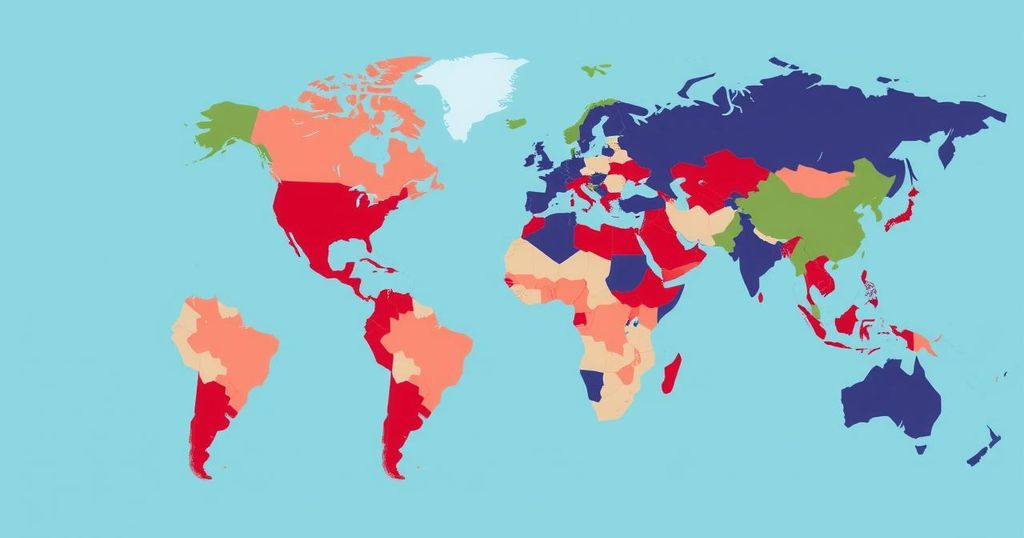The U.S. added South Sudan to its “Do Not Travel” list due to violence and crime, impacting tourism. This decision exacerbates the country’s fragile tourism sector by limiting flights and foreign investment. Similar trends are observed in Yemen, Venezuela, Russia, Libya, Ukraine, CAR, and Haiti, as global instability challenges the travel industry.
The U.S. Department of State has added South Sudan to its highest-risk “Do Not Travel” list, joining nations such as Yemen, Venezuela, Russia, Libya, Ukraine, the Central African Republic (CAR), and Haiti. This decision has been prompted by escalating violence, armed conflict, crime, and kidnappings, effectively excluding South Sudan from viable travel destinations. Consequently, this advisory may severely affect the fragile tourism sector by limiting airline flights, diminishing travel insurance availability, and discouraging foreign investment in the hospitality industry.
The travel advisory is a reflection of rising global instability, with various regions experiencing disruptions due to conflict and crime. Although these advisories are issued mainly for security concerns, they pose significant repercussions for tourism sectors, local economies, and global travel patterns. South Sudan has been plagued by political instability and ethnic violence for an extended period. Following a directive on March 8, 2025, ordering the exit of non-emergency U.S. personnel, the national security situation has deteriorated further.
The warning encompasses violent crimes such as carjackings, shootings, and kidnappings, highlighting the active presence of armed groups and the ease of access to weapons among civilians. Foreign nationals, especially journalists, face heightened risks, as unauthorized reporting can lead to harassment or violence. Despite the potential for wildlife and cultural tourism, the current travel advisory renders a tourism-driven recovery unlikely.
Tour operators specializing in adventure tourism may see a significant drop in bookings, while airlines might reduce or cease flights, complicating travel logistics further. Businesses associated with tourism, including hotels and transportation services, are at risk of failure, as foreign investors often withdraw from countries listed on the “Do Not Travel” advisory, leading to a halt in development projects.
The majority of visitors to South Sudan are aid workers, journalists, or business professionals; however, the latest advisory indicates that even these individuals are susceptible to violence and kidnappings, pressuring organizations to possibly cease operations in the region altogether. South Sudan now joins a growing list of nations facing strict travel advisories from the U.S., each grappling with unique yet severe risks that adversely affect tourism and economic activities.
In Yemen, terrorism, civil war, and utility of landmines create a perilous environment, with no U.S. Embassy support since 2015, leaving American citizens vulnerable. Venezuela is marked by high crime levels and lack of due process for detained citizens, compounded by the absence of U.S. consular services since 2019. Following the invasion of Ukraine, Russia has become increasingly adversarial towards U.S. travelers, creating an atmosphere filled with threats of arbitrary detentions and conflict-related dangers.
Libya remains mired in instability due to militia control, whereas Ukraine continues to endure regular missile attacks, prohibiting safe tourism even in relatively secure areas. The CAR has been troubled by armed conflict and pervasive violence, while Haiti faces extreme political chaos and rampant crime, particularly in Port-au-Prince, where gangs pose substantial risks to both locals and foreigners.
Thus, the U.S. “Do Not Travel” list reflects a deteriorating global security landscape; the incidence of nations facing travel restrictions illustrates alarming trends of rising conflicts and instability. The inclusion of South Sudan further jeopardizes the travel industry, which must now contend with the reality of navigating increasingly hazardous destinations. Travelers and businesses must reevaluate their strategies while these affected nations seek pathways to stability amid ongoing crises.
The addition of South Sudan to the U.S. “Do Not Travel” list signifies a significant setback for its tourism sector in the face of escalating violence and instability. The resulting decline in travel activity and foreign investment will further complicate efforts to bolster the economy. As global security concerns mount, the travel industry must adapt to these challenges, while affected countries strive for solutions within a precarious geopolitical landscape.
Original Source: www.travelandtourworld.com




